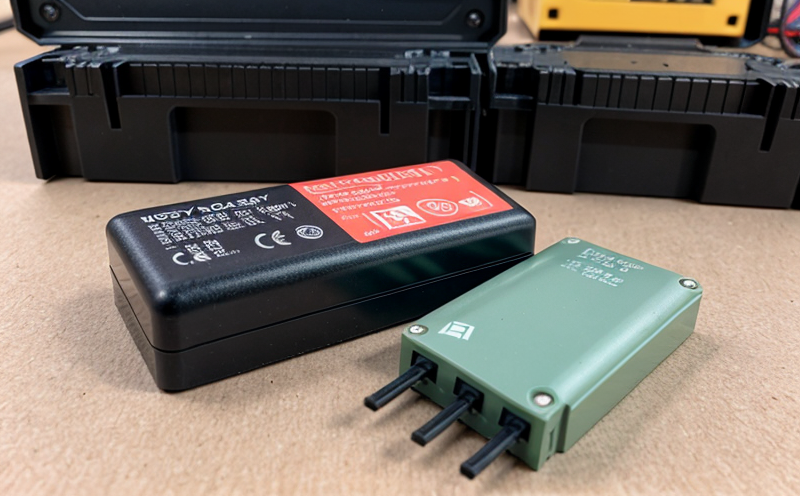DIN EN 62923-1 Marine Battery Pack Performance Testing
The DIN EN 62923 standard is a European normative document that specifies the testing methods for the performance of marine batteries. This comprehensive guide ensures that all marine battery packs meet stringent safety and durability standards, which are crucial in maritime environments where reliability is paramount.
Marine batteries play a critical role in ensuring the safety and efficiency of naval vessels, recreational boats, and other watercraft. The performance testing outlined in DIN EN 62923-1 aims to provide assurance that battery packs will function reliably under various conditions encountered during maritime operations. This includes tests for electrical characteristics, mechanical stability, thermal behavior, and endurance.
The standard covers a wide range of test procedures designed to evaluate the performance of marine battery packs in real-world scenarios. These tests are essential for confirming that batteries can withstand harsh environmental conditions such as saltwater exposure, extreme temperatures, and vibration. By adhering to these standards, manufacturers ensure their products meet international quality benchmarks, enhancing trust among consumers.
One key aspect of DIN EN 62923-1 is its focus on the lifecycle performance of marine batteries. This means not only assessing initial performance but also ensuring that batteries continue to operate efficiently over extended periods. The tests simulate various operational conditions that a battery might encounter, including repeated charging cycles and deep discharge events. Understanding these parameters helps in optimizing product design and improving overall reliability.
Another critical component of this standard is the emphasis on safety features within marine battery packs. Tests are conducted to verify that there are adequate protections against potential hazards such as short circuits or overheating. Ensuring high levels of safety is particularly important given the confined spaces often found in naval vessels and recreational boats.
Testing according to DIN EN 62923-1 also involves evaluating the battery pack’s ability to deliver consistent power output under varying load conditions. This ensures that critical systems on board a vessel, such as navigation lights or communication equipment, receive reliable energy supply even during peak usage periods.
In summary, compliance with DIN EN 62923-1 is essential for manufacturers aiming to produce high-quality marine battery packs capable of meeting both functional and safety requirements. By adhering to this standard, companies demonstrate their commitment to delivering products that can withstand the rigors of maritime operations while maintaining superior performance.
Applied Standards
The DIN EN 62923-1 marine battery pack performance testing is based on several key standards aimed at ensuring the reliability, safety, and efficiency of batteries used in maritime applications. These include:
- DIN EN 62923-1:2015-04
- IEC 60087:2012
The DIN EN 62923 series provides a detailed framework for testing various aspects of marine batteries, including electrical performance, mechanical integrity, and safety features. The IEC 60087 standard complements these requirements by offering additional insights into the design and construction of battery systems.
By integrating these international standards into our testing protocols, we ensure that every aspect of your marine battery pack undergoes rigorous evaluation against recognized benchmarks. This approach guarantees not only compliance with industry regulations but also superior performance across all operational environments.
Scope and Methodology
| Test Parameter | Description |
|---|---|
| Initial Capacity Measurement | This involves determining the maximum amount of charge a battery can hold under specified conditions. It is crucial for assessing the energy storage capability of the pack. |
| DOD (Depth of Discharge) Testing | Tests are conducted to evaluate how well the battery retains its capacity after being partially discharged and then recharged. This helps identify any potential issues with retention over multiple cycles. |
| Cycling Tests | Involves subjecting the battery pack to repeated charge-discharge cycles under controlled conditions to simulate typical usage patterns on board vessels. |
| Overdischarge Capability | Evaluates how long a battery can operate safely after being fully discharged. This test ensures that the pack has sufficient reserves to handle unexpected situations without damage. |
| Vibration Testing | Simulates the effects of vessel movement and rough seas on the stability of the battery pack, ensuring it remains secure during transit. |
| Thermal Cycling | Involves exposing the battery to extreme temperature variations (both hot and cold) to assess its resilience against thermal stress. |
Competitive Advantage and Market Impact
Adhering to DIN EN 62923-1 not only ensures compliance with regulatory requirements but also provides significant competitive advantages. For manufacturers, this standard sets a benchmark for excellence in battery technology, distinguishing them from competitors who may not meet such high standards.
Customers seeking reliable and safe marine batteries can trust products that comply with DIN EN 62923-1, thereby enhancing brand reputation and customer loyalty. Additionally, successful completion of these tests demonstrates a commitment to quality and safety, which is increasingly important in the competitive maritime industry.
From an operational perspective, compliant battery packs reduce maintenance costs and downtime by ensuring consistent performance over extended periods. This leads to improved efficiency and reduced risk of unexpected failures during critical operations at sea.





